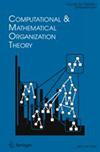Capitalism, Socialism, and the Climate Crisis
IF 1.5
4区 管理学
Q3 COMPUTER SCIENCE, INTERDISCIPLINARY APPLICATIONS
Computational and Mathematical Organization Theory
Pub Date : 2022-01-01
DOI:10.1177/26317877221084713
引用次数: 2
Abstract
The climate crisis calls for a massive and rapid retooling of our economy and society. I argue that we have reasons to doubt that capitalism, even reformed, could meet that challenge. As an alternative solution, authoritarian socialism such as existed in the former Soviet Union or China would be neither attractive nor effective; by contrast, a democratic form of socialism might be both. In a democratic socialist society, we would govern democratically both our enterprises and our economy as a whole. Democratizing the governance of enterprises would help them make better tradeoff decisions and internalize some important externalities. But if they remain at the mercy of capitalist competition in product, labor, and financial markets, many enterprises will be economically unable to retool fast enough, so we also need to pool the country’s economic resources and manage them democratically, collectively, and strategically towards our shared environmental, social, and economic goals. Organizational research on corporate strategic management offers insights into how such an economic system could satisfy four key requirements for a successful fight against climate change—democracy, innovation, efficiency, and motivation.资本主义、社会主义和气候危机
气候危机要求我们对经济和社会进行大规模和迅速的重组。我认为,我们有理由怀疑,即便是经过改革的资本主义,是否能够应对这一挑战。作为另一种解决方案,像前苏联或中国那样的威权社会主义既没有吸引力,也没有效果;相比之下,民主形式的社会主义可能两者兼而有之。在一个民主的社会主义社会,我们将民主地管理我们的企业和整个经济。企业治理民主化将有助于企业做出更好的权衡决策,并将一些重要的外部性内部化。但是,如果他们仍然在产品、劳动力和金融市场上受到资本主义竞争的支配,许多企业将无法在经济上足够快地进行重组,因此我们还需要汇集国家的经济资源,并以民主、集体和战略的方式管理它们,以实现我们共同的环境、社会和经济目标。对企业战略管理的组织研究为我们提供了这样一种经济体系如何能够满足成功应对气候变化的四个关键要求——民主、创新、效率和动力。
本文章由计算机程序翻译,如有差异,请以英文原文为准。
求助全文
约1分钟内获得全文
求助全文
来源期刊

Computational and Mathematical Organization Theory
COMPUTER SCIENCE, INTERDISCIPLINARY APPLICATIONS-MATHEMATICS, INTERDISCIPLINARY APPLICATIONS
CiteScore
3.80
自引率
16.70%
发文量
14
审稿时长
>12 weeks
期刊介绍:
Computational and Mathematical Organization Theory provides an international forum for interdisciplinary research that combines computation, organizations and society. The goal is to advance the state of science in formal reasoning, analysis, and system building drawing on and encouraging advances in areas at the confluence of social networks, artificial intelligence, complexity, machine learning, sociology, business, political science, economics, and operations research. The papers in this journal will lead to the development of newtheories that explain and predict the behaviour of complex adaptive systems, new computational models and technologies that are responsible to society, business, policy, and law, new methods for integrating data, computational models, analysis and visualization techniques.
Various types of papers and underlying research are welcome. Papers presenting, validating, or applying models and/or computational techniques, new algorithms, dynamic metrics for networks and complex systems and papers comparing, contrasting and docking computational models are strongly encouraged. Both applied and theoretical work is strongly encouraged. The editors encourage theoretical research on fundamental principles of social behaviour such as coordination, cooperation, evolution, and destabilization. The editors encourage applied research representing actual organizational or policy problems that can be addressed using computational tools. Work related to fundamental concepts, corporate, military or intelligence issues are welcome.
 求助内容:
求助内容: 应助结果提醒方式:
应助结果提醒方式:


